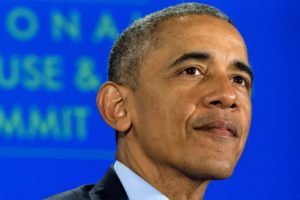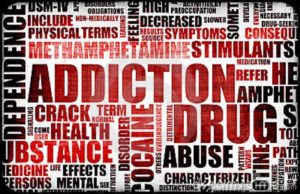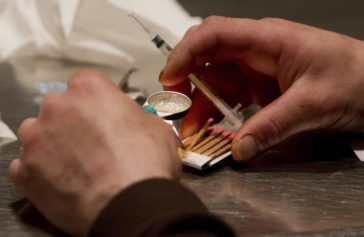President Barack Obama is saying no to the war on drugs, as a part of his approach to treat drug abuse as a public health issue rather than a criminal justice matter. The White House has announced new initiatives to address heroin and prescription drug abuse, as The Guardian reported, with an emphasis on treatment and prevention rather than policing.
The Obama administration has committed $116 million for drug treatment, including nine executive actions that include access to care and overdose treatment, as well as funding for community policing. All of this is part of the president’s budget proposal, in which Obama called for $1.1 billion in additional funding from Congress to battle the drug epidemic. According to the Centers for Disease Control and Prevention, 28,647 people died from opioid overdoses in 2014, a fourfold increase since 2000.
President Obama announced these measures Tuesday with people in recovery and family members; medical professionals; law enforcement; and others at the National Rx Drug Abuse and Heroin Summit in Atlanta. The annual conference was convened by Operation UNITE. He spoke on a summit panel moderated by CNN medical correspondent Dr. Sanjay Gupta.
The president emphasized that each year, more people are dying from drug overdoses than car crashes. He said that for too long, drug abuse has been viewed “through the lens of the criminal justice system,” as the Washington Post reported, adding that “the most important thing we can do” is reduce the demand for drugs.
“The only way that we reduce demand is if we’re providing treatment and thinking about this as a public health problem and not just a criminal problem,” he said to an applauding crowd. “The most important thing to do is reduce demand. And the only way to do that is to provide treatment – to see it as a public health problem and not a criminal problem,” he added, as The Guardian reported.
Moreover, the president also spoke frankly about the racial component of drug policy, and the ways in which addiction is now being regarded as a health issue and a problem impacting whites, rather than chiefly a Black and Brown issue. “We have to be honest about this,” he said. “Part of what has made it previously difficult to emphasize treatment over the criminal justice system has to do with the fact that the populations affected in the past were viewed as or stereotypically identified as poor, minority.”
“Now, things are changing,” he added. “Between 2006 and 2013, the number of first-time heroin users nearly doubled, and about 90 percent of these first-time users were white.”
Among the major components of the president’s plan are $94 million released by the Department of Health and Human Services last month for the purpose of expanding drug treatment in underserved communities. The White House estimates that 271 community health centers will be able to treat 124,000 new patients. Further, $11 million will be allocated for the distribution of naloxone, a drug used to reverse overdoses.

President Barack Obama listens while participating in a panel discussion at the National Rx Drug Abuse & Heroin Summit at AmericasMart in Atlanta, Tuesday, March 29, 2016. (AP Photo/Jacquelyn Martin)
In addition, a newly proposed HHS rule would increase from 100 to 200 the patient limit for doctors to prescribe buprenorphine to treat opioid use disorders, providing increased access to treatment for tens of thousands of individuals with addiction. Meanwhile, another HHS rule will treat substance abuse and mental health services like medical and surgical benefits for Medicaid and Children’s Health Insurance Programs, affecting over 23 million people.
“The President is signing a Memorandum today directing the creation of an interagency Task Force, to be chaired by the Domestic Policy Council, to advance access to mental health and substance use disorder treatment; promote compliance with best practices for mental health and substance use disorder parity implementation; and develop additional agency guidance as needed,” the White House announced. “Federal parity protections are intended to ensure that health plans’ coverage of mental health and substance use disorder benefits is comparable to their coverage of medical and surgical benefits.”
Also as a part of the president’s plan, the Department of Justice’s COPS program will provide $7 million in funding for the COPS Anti-Heroin Task Force Program, a community policing initiative.
The president also announced that the Office of National Drug Control Policy is expanding its partnerships between law enforcement and public health officials to combat heroin use and overdoses. Ohio and Michigan will be added to the existing partnerships in Appalachia, New England, Philadelphia/Camden, New York/New Jersey, and Washington/Baltimore.
Further, as an acknowledgement that substance abuse is also a rural problem, the U.S. Department of Agriculture said that a $1.4 million Rural Health and Safety Education Grant Program — which addresses quality of life in rural areas by way of health and safety education projects — has been expanded to include substance abuse disorders in rural areas.
And under a new initiative with over 60 medical schools, medical students would have to learn the recent CDC guidelines on prescribing opioids, in an effort to ensure that doctors do not over-prescribe painkillers.
“When I show up, usually cameras do too,” Obama said at the summit. “My hope is that it provides a greater spotlight to help solve this problem.”
As the president strives to cement his legacy on criminal justice reform in his final years in office, these latest efforts demonstrate that priorities do matter. And while preceding commanders-in-chief devoted so many resources to waging and escalating the war on drugs — imprisoning Black communities and decimating Black families in the process, just as Nixon intended — vast resources are available if the will exists to end and reverse that war.



